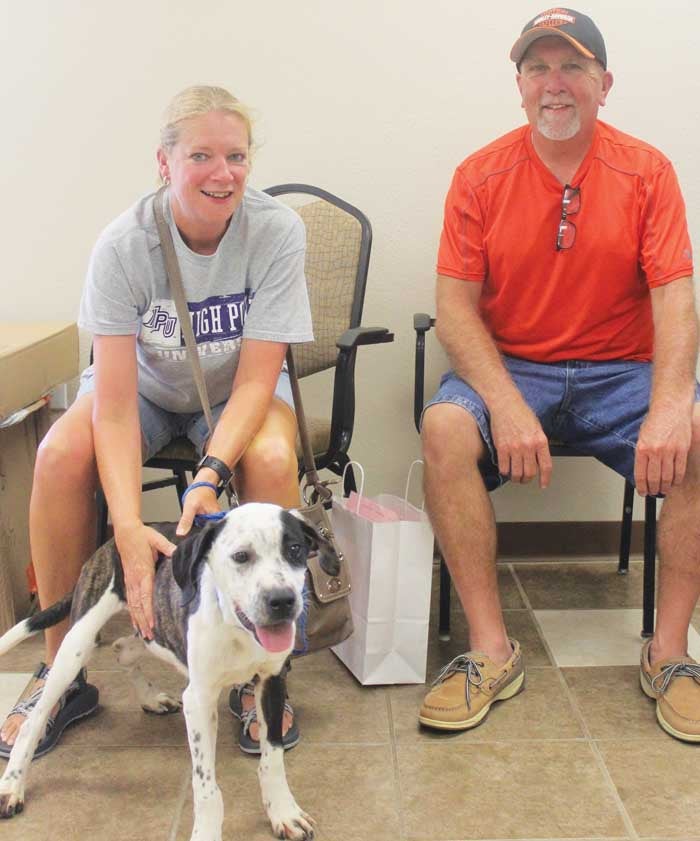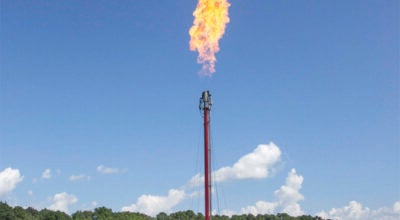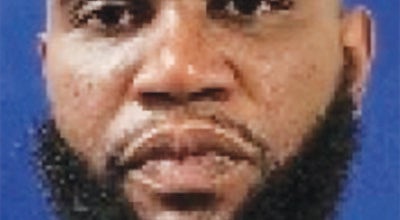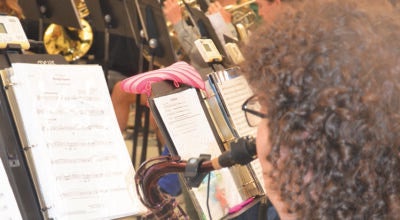Humane Society, animal services working on common goals
Published 9:05 am Thursday, August 3, 2017

- Petey now has a loving home with Dean Joyner and Belinda Brewer, thanks to the combined efforts of the Humane Society of Davie County and Davie County Animal Services.
Humane Society of Davie County (HSDC) staff were emotional as they adopted Petey the puppy into a loving home out of the Eaton Road shelter.
Petey was surrendered to Davie County Animal Services skinny and underweight. Shortly after he came out of quarantine, Petey’s adopters fell in love. Petey, who acted shy around staff, warmed up instantly in his first meeting with his new family.
Petey’s adopters had lost their dog a year ago and were finally ready for a new forever friend. Petey still needed to gain some weight and the adopters were up to the task.
“Nothing beats the satisfying feeling of watching a pet leave with the adopters to start a happy new beginning. It takes dedication, a few tears, and hard work between both organizations to make that happen for every possible homeless pet,” said Carrie DuPre, HSDC marketing manager.
HSDC is working in partnership with Davie County Animal Services (DCAS) at the Eaton Road shelter to save more lives of abandoned cats and dogs. The two organizations focus on the same goals and outcomes: reduction in the number of pets surrendered to the shelter and reduction in the numbers of pets euthanized by DCAS. Such partnerships are becoming increasingly prevalent in order to capitalize on respective skills and resources of governmental animal service and non-profit animal rescue entities; Buncombe and Cabarrus offer examples close to home.
When dogs and cats are brought to the shelter for surrender, DCAS assesses the underlying reasons and attempts surrender intervention. If surrender intervention is not possible, the pet is taken in by DCAS, vaccinated, and placed in quarantine hold. An adoptable pet will move onto the adoption floor when it is deemed healthy and behaviorally sound for adoption.
At that point, HSDC staff will market the pet on websites and in social media and emails. Adoption applicants are welcome to visit to meet the pet, complete the adoption application, and talk with the adoption manager who tries to make a good match between pet and adopter. Upon approval, the pet goes home with its new family.
All pets are vaccinated, spayed or neutered, and microchipped prior to adoption.
In the first week of DCAS being in the building, HSDC sent nine pets home with new families.
“HSDC staff would like to invite the community to help us make our mission of saving more lives a possibility by donating, adopting, fostering, or volunteering,” said DuPre. Adoption hours are Tuesday-Friday 11 a.m.-4 p.m. at 291 Eaton Road in Mocksville or by appointment.
Adoptable pets also get released to area rescue groups and to out-of-state transport partners.
“HSDC hopes to continue working with area rescues that pull from DCAS; these relationships have made a big difference in the numbers of pets saved,” she said. “HSDC has a new active transport partnership with PSPCA, the largest animal rescue group in Pennsylvania that we hope will become a significant means of saving lives.”
HSDC also manages a spay/neuter clinic transport program out of the Eaton Road building. Spay and neuter is the ultimate solution to pet overpopulation and euthanasia, DuPre said.
So far in 2017, more than 230 dogs and cats have been altered through this program, more than 50 percent higher than a year ago. Reservations are required by pet owners seeking to use this service. Call 336-751-5214 for details.
“2017 is definitely a year full of changes and challenges for HSDC, but all parties are focused on a better future for the pets that depend on us. For those of you still working with us as dedicated volunteers, thank you. For those of you contributing financially, thank you. For those of you taking home cats and dogs under our care, thank you. For those of you not yet involved, we invite you to contact us to learn what you can do to help move us forward in our mission,” said Jane McAllister, HSDC president.
HSDC continues to need public support in the form of adopters, volunteers, and donors. HSDC invests more in each adoptable pet than it recovers in the adoption fee. The organization also relies on grant and donor funding to help underwrite spay/neuter surgeries for those needing assistance.
“Please step up in the campaign to save more lives. Your contribution of time or money makes a significant difference in what the organization can accomplish. Thank you for your support,” McAllister said.




